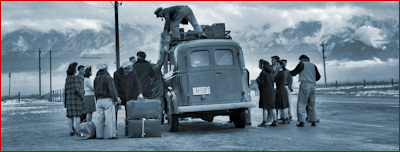1. When this post went live originally, a lot of people thought that they were selling their souls to vote for the "lesser of two evils," given the final choices available to them, so they were going to still vote their consciences, by gum, and the devil take the hindmost. And he has. So let me say here what I said then even though it was widely ignored: this is the time, right now, in the primary process, to vote as far to the extreme as you can muster. Vote insane (cf. Trump and Kasich); vote as if RUSH is your favorite rock band (cf. Rand Paul); vote for the one with the real private-sector experience (cf. Carly); vote for the Guy who has made a career of upsetting the political apple cart for a principle (cf. Cruz); vote for the nice boy (cf. Rubio). Right now is the time to vote entirely on your most critical political principlebecuase now is the time you have the most choices and can steer the ship a little. After the convention is done? Don't complain that we have made sausage. We are making sausage, not Prime Rib.
2. You are not electing a Messiah or a Pastor. Seriously. We should want to be ruled by a just Turk rather than an incompetent Presbyterian every single day until Christ returns.
3. What's the Biblical reason for thinking the way this post is thinking and is asking you to think? I think there are at least 3 good Biblical reasons to think this way:
This is not really what we usually do at TeamPyro, but because it is on thinking about politics and this election I am writing, we will start with the merely-pragmatic. Before starting: this is not an endorsement of [anyone]. This is an examination of one claim by one group of people regarding what they say they believe about voting in this election.
So there’s a lot of hysteria about voting for [anyone] right now, especially from two different kinds of conservatives. One kind can’t vote for a Mormon. The other kind can’t vote for a politician in the real world who, frankly, doesn’t agree with them on every jot and tittle – and supposedly on at least one major political issue. If you are one of these people, this post is probably not for you. I will deal with you later.
There is one class of voter this post is for, and that’s the voter who isn’t a huge fan of [anyone], and is not a fan of [the other anyone], and wants to vote for anyone else more attuned to their stated political beliefs – for example, Ron Paul, or perhaps Pat Robertson, or perhaps Sara Palin – someone farther to the right with better Bona Fides than [anyone]. But they know, in their heart, that this vote is a vote of conscience and not a vote which will actually cause that man to be put into office. So when they are confronted by the objection, “A vote for [[anyone]] is a vote for [the other anyone],” they ask the astute question, “Pray tell: why isn’t it a vote for [a better outcome]?” DJP has dealt with this 4 years ago, but I have something it seems most people have not considered.
Math, my dear friend: Math.
First: objectively, let’s say we have more than 2 candidates (let’s say 3, but it could be 7), and in the choices A, B, or C one votes for “C”, it should be said that a vote for “C” is in fact a vote against both “A” and “B”. There’s no question about that – plainly, the vote is objectively “Not A” and “Not B” but “C”. The problem is that this only assumes that the natural bias of the system would render all choices of equal weight, and a protest vote for “C” against “A” and “B” would have the same effect against “A” as it will against “B”.
Now: what do I mean by a “natural bias”? I mean this:
Political party Registered membersThe natural bias in the electorate, not accounting for partisan enthusiasm or lack thereof, is that the “BLUE” side will get 43.7% of the votes (assuming party loyalty), “RED” side will get 31.1 % of the votes, about 2% will vote for a radical candidate, and there will be 24.3% up for grabs. In a world where, as some are supposing, the major candidates are just about the same sort of elected official, there’s no reason to believe that the “I” votes won’t be split in half – so the final result of this election would be roughly 55-43 BLUE victory.
Democrat (BLUE) 43.1 million
Republican (RED) 30.7 million
Constitution 0.367 million
Libertarian 0.278 million
Green 0.246 million
Independent 24.0 Million
(source: procon.org)
The natural tendency, given the base inclination of the registered voters, is to skew BLUE.
Now: think about this. What has to happen for the election to skew RED is some combination of the following:
- Suppressed BLUE voter turnout (“suppressed” meaning the voters don’t show up – not that they are imprisoned or threatened to stay away from the polls. Don't be like that.)
- BLUE turnout swinging to RED (meaning: moderates make a pragmatic choice to select away from base party affiliation)
- Independent voters overwhelmingly turning to RED candidate vs. BLUE candidate (like: Reagan)
Only these outcomes influence the RED benefit positively, mathematically. Or put another way: only these outcomes negatively influence the BLUE benefit.
There are no scenarios where RED-side voters (such as Constitution and Libertarian) voting either for a non-major party candidate or sitting out benefits RED and not BLUE. RED-side voters must vote RED because they are in the registered minority. If they expect ever to get an outcome on the RED side in the general election, they have to vote for the likely winner on the RED side.
Therefore: So what?
1. Do whatever you think is best in the primaries. I think you should vote as far to the side of the spectrum you favor as you can stomach in the primaries. You should pull your party as far to your way of thinking in the *internal* decision-making process as you think you and your like-minded friends can do it.
2. You have to accept that if our republican form of government is a legitimate form of government, you are never going to get everything you want – even in your own party. And you have to accept that, frankly, that’s a good thing – because you are a sinner just like that tax collector over there. Literally.
3. Once the primaries are settled, you have to do the math. That is: you have to vote for someone with a mathematical likelihood of winning if you really want to affect change. By that, I mean this: historically, there is no way in the clear blue sky that you will ever get a BLUE-side candidate who will get less than 43% of the vote. It simply will not happen. That means your candidate, to actually affect change, has to get a minimum of 44% of the vote to win. Given the numbers above, that means all the Indie voters, and more than half the registered “BLUE” voters. If your alternative candidate cannot get that many votes – and I propose to you that it doesn’t matter who he is: he can’t get them – then you have to ask yourself: do I affect any change by voting for the mathematically-guaranteed loser?
4. Relating to the question asked, above, this is exactly how a vote against Obama but not for Romney ensures Obama’s victory: mathematically, [BLUE SIDE] has a winning plurality of core voters, and no one else does. Seriously: if the electorate splits by registration saturation, BLUE wins the plurality. When you cast your vote, you need to vote remembering that if you cast a vote which creates a plurality, you are spinning the result toward the party with the inherent plurality-winning base.
1, 3 and 4 are simple mathematical realities; 2 is a political reality – that is, accepting the rules by which the game is played.
Hope that helps.













